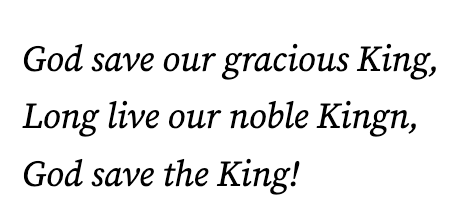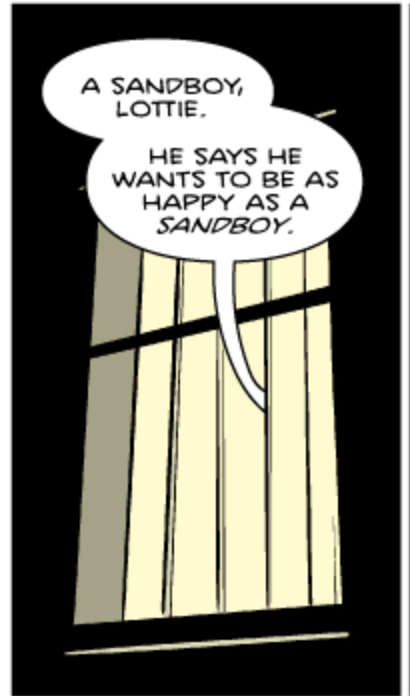The mystery of sóng (U+2AA0A) ("semen")
Matt Jenkins writes:
Jichang Lulu wrote about 㞞 on the Language Log back in March [see "Selected readings" below], but that post didn't include any reference to (U+2AA0A).
Read the rest of this entry »
Matt Jenkins writes:
Jichang Lulu wrote about 㞞 on the Language Log back in March [see "Selected readings" below], but that post didn't include any reference to (U+2AA0A).
Read the rest of this entry »
 A story in this morning's Guardian (Alex Finnis, "National Anthem lyrics: How the words will change to God Save The King after the Queen’s death") evokes the (now generally unfair) nickname of Grauniad, spelling King as "Kingn".
A story in this morning's Guardian (Alex Finnis, "National Anthem lyrics: How the words will change to God Save The King after the Queen’s death") evokes the (now generally unfair) nickname of Grauniad, spelling King as "Kingn".
I've been told that the issue behind the nickname arose because the Guardian was typeset in Manchester (where it was founded), and then the printed copies were shipped by train to London. There was typically only one edition per day, and so typographical errors could not be corrected in later editions, as they could be for London-based papers, where the edition printed in the wee hours would be superseded by editions printed at intervals throughout the day.
Read the rest of this entry »
Current text-to-speech systems are pretty good. Their output is almost always comprehensible, and often pretty natural-sounding. But there are still glitches.
This morning, Dick Margulis sent an example of one common problem: inconsistent (and often wrong) stressing of complex nominals:
We have a winding road that we drive with our Google Maps navigator on, to keep us from taking a wrong turn in the woods. We have noticed that "West Woods Road" is rendered with a few different stress patterns as we go from turn to turn, and we can't come up with a hypothesis explaining the variation. Attached is a recording. It's a few minutes long because that's how long the trip takes. The background hum is the car.
I've extracted and concatenated the 11 Google Maps instructions from the four minutes and five seconds of the attached recording:
Read the rest of this entry »
Just out today, this is one of the longest book reviews I have ever written:
Jack W. Chen, Anatoly Detwyler, Xiao Liu, Christopher M. B. Nugent, and Bruce Rusk, eds., Literary Information in China: A History (New York: Columbia University Press, 2021).
Reviewed by Victor H. Mair
MCLC Resource Center Publication (Copyright September, 2022)
I am calling it to your attention because the book under review, which I will refer to here as LIIC, signals a sea change in:
1. Sinology
2. Information technology
3. Academic attitudes toward the study of language and literature
Read the rest of this entry »
For those who read Russian, with commentary for those who do not:
Грешный мой язык
«Прибалтика», «На Украине» и «Белоруссия»: теперь это моветон. А «санкционка», «рашист» и «путиноид» — новые слова. Как война изменила русский язык
13:03, 30 августа 2022 Максим Пушкарев , «Новая газета Балтия»
—–
Greshnyy moy yazyk
«Pribaltika», «Na Ukraine» i «Belorussiya»: teper' eto moveton. A «sanktsionka», «rashist» i «putinoid» — novyye slova. Kak voyna izmenila russkiy yazyk
13:03, 30 avgusta 2022 Maksim Pushkarev , «Novaya gazeta Baltiya»
—–
Sinful my tongue
"Baltic States", "In Ukraine" and "Belarus": now it's bad manners. And “sanction”, “rashist” and “putinoid” are new words. How the war changed the Russian language
13:03, August 30, 2022 Maxim Pushkarev, Novaya Gazeta Baltiya
Link to whole article in Russian
Read the rest of this entry »
"Don't miss the most loved conference by Delphists like you!"
Philip Taylor wrote to complain about that phrase, which apparently arrived in an email advertisement:
"The most loved conference …" ? I would have written "The conference most loved …".
But his preference apparently disagrees, not only with the author of that flyer, but also with most other writers of English. And it's wonderful how easily we can now check such things. As Yogi Berra (may have) said, "Sometimes you can see a lot just by looking".
Read the rest of this entry »
Recently, a package from Canada arrived at the Penn Linguistics Department — though it was addressed to
Dept. Di Linggwistika
U. Di Pensilvania
Fiiladelfia, Pa
19,104, U.S.Å
It contained multiple copies, on variously-colored paper, of an odd 11-page document.
Read the rest of this entry »
From Breffni O'Rourke, another example of the conceptual tangle created by the interaction of scalar comparison and (implicit) negation:
Just another one of these. There's no outright negation, but it seems related – the implied negative of "only" interacting with the scalar comparison "more slowly". The arithmetic comes out with the wrong sign in any case:
"The Tories came back into power in 2010. Over the course of this unbroken period of rule, typical household incomes in Britain have risen more slowly than those in only two other western European countries: Greece and Cyprus."
He means either "…risen more slowly than those in all but two other…" or "risen faster than those in only two other…".
The quotation is from Fintan O'Toole, "Liz Truss will make Johnson seem a political genius, May a mistress of empathy, Cameron a beacon of sincerity", The Irish Times 9/5/2022.
And as usual, it's really hard for our poor monkey brains to process cases like this — I agree with Breffni about this one, but no doubt some commenters will not.
Read the rest of this entry »
TIL a new word — well, a new compound: sandboy. And an associated collocation, "happy as a sandboy".
 The source was today's Bad Machinery, which includes the panel on the right.
The source was today's Bad Machinery, which includes the panel on the right.
The author, John Allison, notes that
I got nervous after making this comic that “happy as a sandboy” is racist, but apparently a sandboy was a youth paid to collect dry sand from coastal caves to spread on saloon bar floors. I know. Dodged a bullet there.
The comments include a link to an attempted explanation in The Guardian, "What is a sandboy and why are they happy?" — but as usual, there's more to the story.
Read the rest of this entry »
Important breakthrough:
Friends of ASOR 10.8 (August, 2022
With numerous fine illustrations, here omitted, though the captions (in italics) have been retained.
Research in the humanities achieves definitive results in very few cases. The decipherment of an ancient writing system is probably one of them. Successful decipherment efforts in the 20th century include Mycenaean Linear B (by Alice Kober, Michael Ventris, and John Chadwick), Mayan glyphs (by Yuri Knorozov and Tatiana Proskouriakoff), and Luwian/Anatolian hieroglyphs (started by Helmuth Theodor Bossert, Emil Forrer, Ignace J. Gelb, Bedřich Hrozný, and Piero Meriggi; continued by Emmanuel Laroche; and completed by David Hawkins and Anna Morpurgo-Davies). To this list can now be added an important writing system used in southern Iran between 2300 and 1880 BCE, the Linear Elamite script.
Detail of the Marv Dasht vessel, with an example of Linear Elamite writing (21st century BCE; courtesy of the National Museum of Iran).
Aerial view of Susa (courtesy of the Cultural Heritage Base of Susa).
Read the rest of this entry »
It'sssssssssssss finally out!
✨ The Hanmoji Handbook: Your Guide to the Chinese Language Though Emoji ✨ — by me, An Xiao Mina & @jenny8lee, published by @MITeenPress — appears in bookshops across the US and Canada today! pic.twitter.com/sTkudPAwxb
— Jason Li (@jasonli) August 30, 2022
Read the rest of this entry »